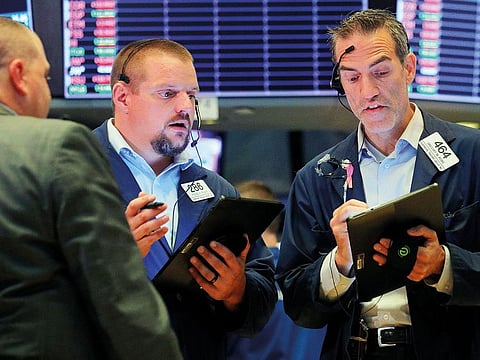Global stocks will keep a cap on any major gains this week
As Wall Street earnings turn sour, shareholders brace for more virus-dogged results

Dubai: As companies and economies further reveal the damage caused by the ongoing coronavirus pandemic, markets will stay wary of making any significant gains this week.
Global stocks closed marginally higher last week as investors cautiously raked in gains in spite of dire economic data and corporate earnings that demonstrated the devastating effect of lockdowns.
Markets ended April in comparatively better shape amid growing optimism that movement restrictions will be eased further this month as countries entered the recovery phase of the coronavirus crisis.
Another trade war imminent?
However, sentiment turned sour on Friday after US President Trump threatened to levy tariffs on China for their handling of the coronavirus outbreak – reviving an issue that dogged markets all through last year, the US-China trade spat.
Before this latest sign of market weakness, the S&P 500, an index broadly considered to represent global markets, rallied over 36 per cent since March-lows, and also recovered over 65 per cent of the COVID-19 selloff.
One cannot dismiss growing doubts on whether the seemingly unending trade tensions between the world’s top two economies will flare up again in the near term.
But while this calls for market participants to turn nervous, analysts feel it is more likely that investors will use it as an excuse to lock in profits.
Unlikely to follow through
“With the US Presidential election only six months away, President Trump is unlikely to follow through on any of the upcoming tariff threats,” wrote Ed Moya, a market analyst with OANDA.
“The main driver for weakness in stocks is the profit-taking with mega-caps Apple and Amazon,” Moya further added, referring to the market decline seen during the end of last week.
While tech giant and iPhone maker Apple last week reported sales and profits that beat Wall Street expectations, CEO Tim Cook warned of uncertain times ahead. Also, Amazon signaled they are spending all of their second quarter profits on its coronavirus response, while calling for caution among its investors.
More CenBank meetings ahead
Beyond coronavirus, the focus this week again will be on central banks with scheduled meetings of the Bank of England and the Reserve Bank of Australia, with no policy changes expected.
“We do not expect significant announcements from either (RBA or BoE) as measures previously announced remain a work in progress,” said Aditya Pugalia, director of financial markets research at Emirates NBD.
“Investors will also keenly watch the non-farm payroll data which is likely to confirm the extent of damage to employment as shown by initial jobless claims figures.”
Ballooning US jobless rate
Analysts expect a total of 20 million people to be unemployed in the US, while the jobless rate balloons to 14 per cent in the world’s biggest economy.
“This is no surprise, given the way initial jobless claims have surged over the past month, but comes as a stark reminder of the challenges facing the world’s largest economy,” noted Chris Beauchamp, IG chief market analyst at online trader IG Group.
Also, US earnings will continue to come through thick and fast, with Disney, PayPal and Uber the names to watch, as investors wait to see how these firms are dealing with the global economic crisis.
Markets in “league of their own”
The improvement in risk appetite in global markets was underpinned by central banks reaffirming their commitment to providing ample support as and when required.
“Global equities, over the past month, have remained in a league of their own,” Pugalia added. “The price movement indicates that equity investors retained their focus on central bank support and easing measures announced by various governments.”
Many investors are under the impression that any ease in stringent curfews will give way to a sharp global recoveries in the second half of the year with the hope the negative fallout will be short-lived, especially if a treatment or vaccine for COVID-19 is found.
However, most analysts are distancing themselves from this general market wide optimism, while calling for more volatility going forward.



